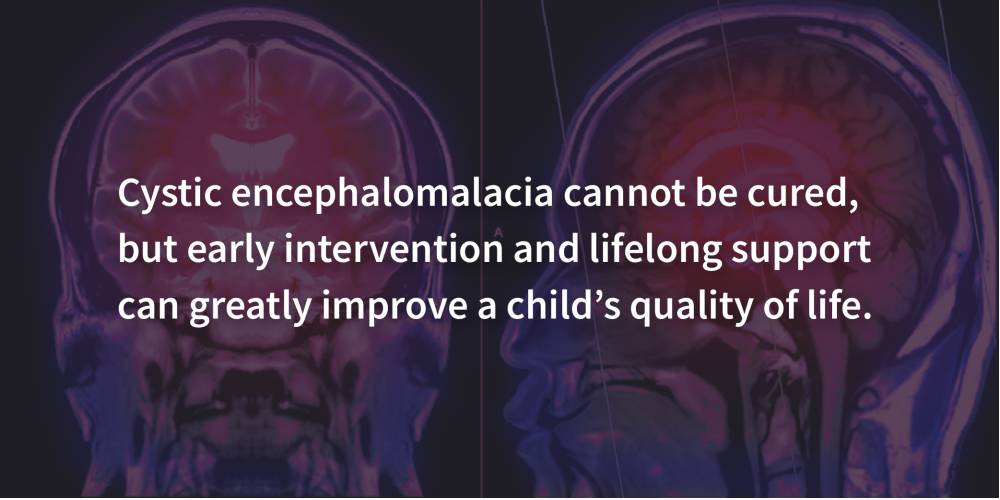Chicago, IL 60601
FREE CONSULTATIONS 312-462-4200
TOLL FREE 833-462-4200
What Treatments Can Be Used for Infants With Cystic Encephalomalacia?
 When a newborn suffers a brain injury, the effects can alter every part of that child’s life and the family’s future. Among the most serious conditions is cystic encephalomalacia, a rare but devastating form of brain damage that involves the formation of fluid-filled cysts within the brain. This condition is permanent, often leaving children with lifelong developmental and medical challenges. Parents who are coping with this diagnosis need clear information about treatment options, long-term care, and their legal rights if medical negligence played a role.
When a newborn suffers a brain injury, the effects can alter every part of that child’s life and the family’s future. Among the most serious conditions is cystic encephalomalacia, a rare but devastating form of brain damage that involves the formation of fluid-filled cysts within the brain. This condition is permanent, often leaving children with lifelong developmental and medical challenges. Parents who are coping with this diagnosis need clear information about treatment options, long-term care, and their legal rights if medical negligence played a role.
As of September 2025, doctors in Illinois continue to rely on a combination of medical treatment, therapy, and supportive care to address the effects of cystic encephalomalacia. While there is no cure for the condition, early intervention and appropriate management can make a significant difference in a child’s quality of life.
Families in Cook County and across Illinois should also understand that legal remedies may be available if improper prenatal care, delivery errors, or failure to recognize fetal distress caused the injury. Our Chicago birth injury lawyers can discuss your case further whenever you are ready.
What is Cystic Encephalomalacia?
Cystic encephalomalacia occurs when softening of the brain tissue leads to the formation of cerebrospinal fluid-filled cysts. These cysts can vary in size and location, and their impact depends on which parts of the brain are affected. Causes may include:
-
Birth trauma, such as improper use of forceps or vacuum extractors.
-
Oxygen deprivation during labor and delivery (known as hypoxic ischemic encephalopathy, or HIE).
-
Infections during pregnancy or shortly after birth.
-
Maternal health conditions such as diabetes or hypertension.
-
Certain medications taken during pregnancy, particularly those that affect blood clotting.
-
Genetic or metabolic disorders, in rare cases.
Once cysts form, the structural damage to the brain is irreversible. Children may develop cerebral palsy, epilepsy, developmental delays, intellectual disabilities, behavioral disorders, or limited mobility. The severity of symptoms depends on how widespread the damage is.
Symptoms of Cystic Encephalomalacia Parents May Notice
Parents are often the first to observe signs that something may be wrong. Early red flags include seizures, difficulty feeding, delays in reaching milestones such as crawling or walking, unusually stiff or floppy muscle tone, or persistent irritability. Pediatric neurologists and developmental specialists typically confirm diagnoses through MRI scans or other imaging tests.
Recognizing symptoms early is critical because intervention during infancy and toddlerhood offers the best chance for improved outcomes. Illinois’ Early Intervention Program provides therapy services for children under age three who are diagnosed with developmental delays, and families coping with cystic encephalomalacia often qualify for these services.
Treatments for Children With Cystic Encephalomalacia
Although cystic encephalomalacia cannot be reversed, children benefit from treatments that manage symptoms, reduce complications, and foster independence. Care plans are typically multidisciplinary, involving neurologists, surgeons, therapists, and social workers.
Surgical Options
Surgery is considered only in severe cases where large cystic lesions are producing pressure, severe seizures, or neurological decline. Neurosurgeons may drain cysts or implant shunts to divert excess cerebrospinal fluid. While surgery can improve outcomes in select cases, it carries risks and is not suitable for every child.
Seizure Management
Seizures are among the most common complications. Antiepileptic drugs can reduce their frequency and severity. In some cases, neurologists may recommend a ketogenic diet or, rarely, surgical interventions to manage intractable epilepsy.
Physical Therapy
Children often struggle with muscle weakness, poor coordination, or spasticity. Physical therapy focuses on building strength, improving range of motion, and teaching adaptive skills to support mobility. With consistent therapy, many children achieve greater independence than would otherwise be possible.
Occupational Therapy
Occupational therapy helps children master everyday activities such as feeding, dressing, and grooming. Therapists introduce adaptive tools and teach strategies that make tasks more manageable, which can lessen frustration for both children and parents.
Speech and Language Therapy
Delays in speech and communication are common. Speech therapists may teach children verbal communication or alternative systems such as sign language or communication devices. Early language support is essential for social and academic development.
Supportive and Long-Term Care
Many families also work with nutritionists, psychologists, and social workers. Support may include feeding tubes for children with swallowing difficulties, behavioral therapy for frustration or anxiety, and respite care for parents who face the daily challenges of caring for a child with significant needs.
The Financial Burden of Treating Cystic Encephalomalacia
Managing cystic encephalomalacia often requires lifelong care, which can cost hundreds of thousands or even millions of dollars over a child’s lifetime. Typical costs include frequent hospital visits and medical procedures, along with ongoing physical, occupational, and speech therapy. Medication, special education programs, in-home assistance, and even modifications to the family home are common necessities with this challenging condition.
Families in Chicago and Cook County should know that government programs, private insurance, and nonprofit resources may provide some financial assistance, but these resources rarely cover the full cost of care.
Legal Options for Families Facing Cystic Encephalomalacia Because of Medical Malpractice
If cystic encephalomalacia resulted from preventable medical errors, families may be entitled to compensation through a birth injury claim. Examples of negligence may include failure to monitor fetal distress, delayed emergency C-section, improper use of delivery instruments, or failure to treat maternal infections.
Under 735 ILCS 5/13-212(b), parents generally have eight years to bring a medical malpractice claim on behalf of a child. However, acting quickly is critical because gathering medical records, consulting experts, and proving negligence takes time. Compensation may cover medical bills, therapy, long-term care, special education costs, lost earning potential, and pain and suffering.
Families pursuing these cases often feel overwhelmed by the thought of suing hospitals or doctors. A skilled birth injury attorney provides clarity, manages the legal process, and advocates for the resources a child will need for the rest of their life.
Resources in Illinois for Children with Cystic Encephalomalacia
Illinois families have access to several programs that can support children with cystic encephalomalacia:
-
The Illinois Early Intervention Program for children under three.
-
Special education services through local school districts under the Individuals with Disabilities Education Act (IDEA).
-
The Division of Specialized Care for Children (DSCC) at the University of Illinois, which provides care coordination and financial support.
-
Medicaid waiver programs that assist families with medically fragile children.
Accessing these resources requires persistence, paperwork, and sometimes legal advocacy.

Contact Our Cook County, IL Birth Injury Attorneys
Parents deserve compassionate guidance and strong advocacy as they handle impossibly difficult situations involving their children’s health. Our Chicago birth injury lawyers understand both the medical and legal complexities of these cases. We help families in Cook County and across Illinois identify the cause of their child’s injury, pursue financial recovery when negligence is involved, and connect with the resources needed to support lifelong care.
Call Birth Injury Law Alliance, Ltd. today at 312-462-4200 to arrange a free consultation. We will listen to your story, review your options, and fight to protect your child’s future.





